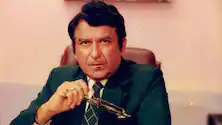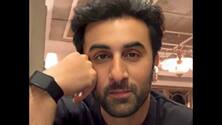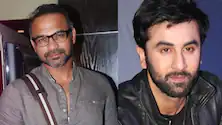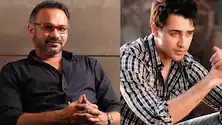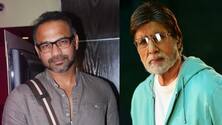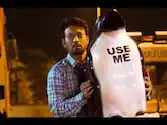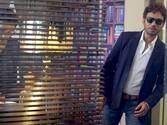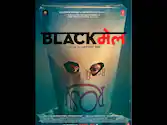EXCLUSIVE! 10 Years Of Delhi Belly: Abhinay Deo: If It's Not Imran Khan, There Won't Be Taashi In The Sequel
Imran Khan's pleasing escapist fare Delhi Belly released in theatres ten years ago on this day (July 1). Cut to present, as I wonder time flies and how, director Abhinay Deo who is on the other side of the phone call, breaks into a laugh and quips, "Absolutely, tell me about it." The excitement in his voice is palpable.
Over the next half an hour or so, it's a walk down the memory lane for both Abhinay and me as we discuss how the film was a breath of fresh air, the possibility of a sequel sans Imran Khan after the actor reportedly bid goodbye to his acting career, the change in consumption of content with the advent of OTT platforms, how the pandemic has changed him as a person and much more.

Here's Filmibeat in an exclusive tete-a-tete with Delhi Belly director Abhinay Deo. Over to the storyteller...


'I Wouldn't Want To Change Anything About Delhi Belly'
Q. Ten years ago when Delhi Belly released, it was hailed for its bold and clutter-breaking storytelling when it comes to humour. The film has retained its freshness and makes you laugh hard even when you watch it today. All through these years, did you ever revisit the film and analyse why it clicked with the audience?
A. A lot of analysis has happened for Delhi Belly. Not just us, but even the industry pundits tried to analyze why it worked. There are many answers to it. Importantly, Delhi Belly was a very non hypocritical film. It was irreverent and very well-written. The writer (Akshat Verma) had taken nine years to write fifteen drafts of it to select the right one. So, there was a lot of hard work involved. Many people think that Delhi Belly was all about bad words and some adult innuendoes. But the film was not just about all that. Delhi Belly had so much detailing in it. We had put so many punches into it. The already good writing was supported by layers which were introduced to it. That's possibly one of the reasons why it did well. Like any other film in the world which does well, it is because of lot of hard work and attention to detail.
Q. When you look at Delhi Belly, is there anything that you would want to change about the film?
A. No, not at all. I would not want to change anything about it. For me, filmmaking is not something like a factory where you look at it and say, "Accha isme gadbad hai, chalo theek karte hai," because every scene that you do has a different reason, a different pitch and humour. Hence, you shouldn't touch the spontaneity of it.

'Delhi Belly Was A Breath Of Fresh Air'
Q. The irreverence of the film is the best thing about Delhi Belly. It's not passing any kind of message. Do you feel sometimes it's important for filmmakers to take a breather and let entertainment take the front seat?
A. In life, you just can't keep working and intellectualizing things. There are times in a day when we also take a break and don't do anything. We just sit back and look at the passing birds and spend our time. I think that's very important when it comes to work in this industry. Of course, each to his own, but the fact is you should take a breather. That's what Delhi Belly was. It was fresh breath of air that came in, which for a long time people hadn't felt. It was unabashed. It was very unapologetic. We were like this is how things happen, this is how youngsters speak. There was no hypocrisy there. Indian films were hypocritical to a large extent at that point where we wouldn't speak the youth language. In films, you would speak a very flowery language with punches. Nobody does that in real life. In real life, there would be a cuss word in every third sentence (laughs). We were very honest in that sense.
Q. Time and again, there have been rumours about Delhi Belly sequel. You had mentioned that if the script is good, you would make a sequel. Is there any update on that?
A. (laughs) It's heartening to know that ten years after Delhi Belly, people still want to see a sequel to that film. It is still relevant and fresh in people's mind. Even I would like to do a sequel. But then, there are things which can't happen just because we want something. Akshat took nine years to write the first part. So, it needs to come to the writer as a script or an idea. Only if he's convinced about it, we will be able to make it.

Array
Q. I remember Imran Khan saying that he would love to be a part of Delhi Belly sequel whenever it gets made. However, last year there were reports that he has bid adieu to acting and wants to focus on direction. If not him, who you do you think would be an apt choice to play Taashi?
A. It's very difficult. We don't know. If it's not him, I don't think there will be any Taashi there. Taashi is immortalized by him. He has done a fabulous job. If there is a sequel, maybe we will work around the present given circumstances. Of course, I would love to believe that he would like to make an exception with Delhi Belly at least and come back into acting. If not, then we will have to reinvent it as we come to it (pauses). We don't know.
Q. Sequels are also tricky to pull off. If you had to make one for Delhi Belly in today's times, what do you think would the biggest challenge for you as a filmmaker?
A. The biggest challenge while making Delhi Belly sequel would be to go beyond the expectations of the audience. That's one of the biggest negatives of having made a film like Delhi Belly, especially when it has achieved a kind of cult status. When that film released on July 1 ten years back, nobody expected anything out of it. And then this film hit them. Now, everybody has expectations. They would be looking at the sequel with magnifying glasses. So, the biggest challenge is going to be to stand true to their expectations.

'Audience Is Not Crazy; They Will Not Just Bash A Film Because They Can'
Q. You had mentioned in one of your interviews that you always wanted to tell stories whether in 60 seconds, 60 minutes or two hours. In the last few years especially since the onset of pandemic, the content consumption pattern of the audience has changed a lot. People have aggressively taken their content to OTT platforms and 'Quarantine & chill' has become the new COVID-19 lingo. How do you view this shift as a story-teller because now, you are catering to an audience who has an access to content across the globe in just one click?
A. I am a die-hard optimist. I only look at things in an optimistic kind of way. If you look at the current scenario and the changing pattern of how content is consumed, I think it has both pros and cons. The negative aspect is very obvious that the audience is brutal. They will switch on to some other content if they don't like the first three minutes. The film might be great after that but you have lost them. The other brutality of it is social media. Today, everybody has a voice. They are half a second away from bashing you on social media. So, these are the negatives.
However, I believe that the positive aspects are far greater. Because today, every idea has a chance to get out there on screen. Content of varied kind and nature can come out in front of people and it's available just at the click of a button. I feel there's so much more in today's times. Criticism is never bad. Cynical criticism of people or cynical consumption pattern of people is something which we all filmmakers will have to deal with. Ten-twenty years back, the problem was that you couldn't really make the film that you wanted to because you just had to make the kind of films which works. Today, the good part is that you can do that. You should be prepared for criticism. I think we are in a great place when it comes to filmmaking and content creation. If your film is good, it will be appreciated and if its not, it won't. Audience is not crazy. They will not just bash a film because they can.

'All Filmmakers Should Be Open To Criticism Because We Are Not Making Movies For Personal Consumption'
Q. How open are you to constructive criticism?
A. I am extremely open to constructive criticism. In today's times, all filmmakers should be open to criticism because we are not making movies for personal consumption. We are making films for the audience though they are your expressions. They can be something that you want to say. Remember and never forget that these are not films that are meant for you to criticize; they are meant for others to consume and criticize your performance. One should remember that in the world out there and the kind of polarized world in which we live today especially in Indian context, if that kind of audience is watching your content, you have to be open to criticism. Of course, you have to take them with a pinch of salt as some of them can also be brutal. But then the point is, guys, grow a thick skin, man! At end of the day, you must be able to take it as constructive criticism and not in a cynical way.
Q. Recently, the Centre released the draft Cinematograph (amendment) bill wherein the Centre will be empowered with 'revisionary powers' with which it can order the re-examination of an already certified movie. Many filmmakers have criticized this move and said that it will endanger freedom of expression and democratic dissent. What's your take on this?
A. I look at it in a different way. We live in an environment in a country where in the last seven-eight years, social media has picked up so much of importance. Criticism has almost become like a birthright to people. Apart from that, you also have the opening through OTT platforms where you can tell any story which you want. Now, along with that, there will come some kind of readjustments and realignments. I think we are in that process of realignment.
Everybody is trying to see what is the right way to balance it. As a country and as an industry, we have to come to a kind of right balance. Right now, sometimes the right side becomes heavier and sometimes the left side. But eventually, it's a process. Give it time and we will come to the right place and the right decision of how we will be able to co-exist.
On one level, I totally agree with the producers and directors who are saying that this is a democratic country and we should be able to say what we want. On the other level, I am also agreeable to the fact that as an establishment/ government, they also need to make sure that in a country where varied kind of people live, it doesn't harm or wrongly touch or hurt any sentiments. So, there's a little bit of both that we need. But I think over the next couple of years, we will all come to some kind of balance.

'You Must Be Able To Press The Reset Button Every Once In A While To Stay Relevant'
Q. What's next in the pipeline for you?
A. Ten years after Delhi Belly, I am ready to do another film in that genre. (laughs). There are a couple of scripts which are exactly in that same space and genre. Of course, it has nothing to do with Delhi Belly, but they are in that same space of humour. I am really excited about them because those can become once again ten years later, I would like to put myself in doing something that's as wacky as Delhi Belly. The script is the most important part.
Hopefully next year, and of course, the pandemic has put a little bit of a breaker. But post things settling down on the COVID end, we should be able to come up with something as wacky as Delhi Belly.
Q. To sum it all, when you look back particularly in the last year and a half, how has the pandemic changed you, both as Abhinay the filmmaker and Abhinay the person?
A. I will have to say this and I hope people don't take it in the wrong way. But I think the pandemic on one level was terrible when it comes to world at large but on personal level, it was something that allowed me to push the reset button. It gave me the time and that space to separate from what we were doing. By luck, everything stopped, as a person, you were forced to think about your last ten-twenty years, to think what life is all about, to think what's precious and important, what is the real crux of life.
Tropically speaking, personally, the pandemic and the breaks that it applied on my life has helped me tremendously. In every creative person's life, you must be able to press the reset button every once in a while to be able to stay relevant and reinvent yourself. That's what the pandemic did for me in my personal and professional life. I got down to pen and paper and started thinking about what I want to make next. I have created some ten-twelve pieces of content which is great and subsequently, I will start making them.




 Click it and Unblock the Notifications
Click it and Unblock the Notifications





